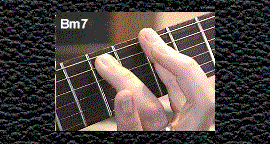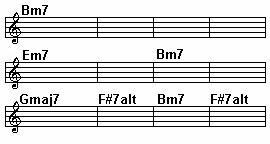Scroll through the lesson and click on notation/video/audio links to load the interactive players.
Please subscribe to get full access to all lessons for only $7.95/month PLUS 1 week free trial.

Riff Interactive lessons are
LESS expensive and
MORE interactive than alternatives!
More Info
|
|

Jam Sessions - All
Blues Styles
Lesson 5 - Bm Blues
Lesson Sample
Lyle:
This jam is a slow blues in the key of Bm. The chord progression has 4 chords in
it:
chords
chords

Lyle: This chord progression almost has a jazz
sound to it, probably because of the added Gmaj7 into the F#7alt
chords.
Lyle: Here's the chord progression and your
looping jam track to play along with:
chord chart

Jam Track - Bm Blues
Lyle:
The F#7 alt. (alt. means altered dominant) is really an F#7
#5#9.
weasels:
How do you come up with the chord arrangements, is there a pattern like the 12
bar 1 4 5 chord progression?
Lyle: This is a 12 bar blues progression. There
are MANY different ways to play a blues chord progression. The V chord is mostly
used at the end of the progression. How you get form the I chord to the V chord
in the inside 12 bars is another story.
luckyex: How can I do the F#chord, it is really
hard for me?
Lyle: Here's are a few other ways to play the
F#alt. chord:
F#7#9
ZZ: What makes
it an alternate?
Lyle: alt = altered, the 5th may be lowered or
raised, same with the 9th.
Donna: I like this F#7alt, feels like it leads to
something else.
weasels: So on the 12 bar, 1 4 5, it can be in any
order as long as it a 1 4 5 chord right?
Lyle: Weasels, depends on how you want it to
sound. I suggest you learn and analyze a dozen or more 12 bar blues progressions
and see where they use the 1 - 4 - 5 chords within the 12 bars. You'll see a
common theme: The 1 chord during the first 4 bars, the IV is introduced at bar
5, the V chord is introduced at bar 9 or higher.
ZZ:
Altered dominant chords sounds like a Steve Ray V.
chord
Eric: It's
the Jimi chord!
Lyle: The altered dominant is a very colorful
chord to use. The E7#9 chord is also known as the Hendrix chord yes! He used it
in the song Purple Haze.
Lyle: Here's how I played the rhythm guitar part
for this jam:
rhythm riff
Lyle:
This uses a very loose rhythm, very laid back. When you play the Bm7 you don't
need to play all the strings. Examine the tab.
Lyle: You'll be muting each chord again by
lifting off the frets slightly after each hit. Look close at my left hand in the
video to see this technique.
rhythm riff
Lyle:
If you were to improvise over this jam in B minor, I suggest using the B natural
minor scale, which sounds more melodic than the plain minor
pentatonic:
B
natural minor scale
Lyle:
Here's the first solo from the lesson sample. It is made from the notes in the B
natural minor scale:
solo 1
solo
1
Lyle: When I improvised this solo, I started in
the middle of the scale pattern, worked my way to the low notes, and then worked
my way back up to high notes for the end of the solo.
Lyle: A fancy scale to play over just the F#7
alt. chord is the B harmonic minor. This is because of the A# note that is in
the F#7 chord and not found in the B minor chord or scale. Playback this
example:
B
harmonic minor compare
Lyle:
Now I want to show you a pattern for the B minor pentatonic. Playback the TAB so
you see it on the fretboard.
B minor pentatonic
Lyle:
Here's a solo using the B minor pentatonic. It has a B.B. King style and sound
to it:
solo
2
solo 2
Lyle:
The first solo used the natural minor scale, the second solo used the minor
pentatonic.
Lyle: This is a good jam to work with for any of
you who don't have the speed riffs down yet. The slow, laid back tempo gives you
time to explore the different sounds of the notes in the scales you use when
improvising.
Lyle: Hope this has been a fun blues jam for you.
Thanks and see you next
time!
|
<< load notation from left
|
|
<< load audio from left
|
<< load audio from left
|